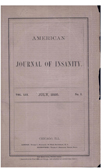Importance of psychotic features to long-term course in major depressive disorder
Abstract
OBJECTIVE: Most efforts to describe the prognostic significance of psychotic features in depression have been limited to single assessments 1 year or less after the initial evaluation. However, the various biological and treatment response differences between patients with psychotic and nonpsychotic depression suggest that prognostic differences may be very long-term. METHOD: The 787 patients described here entered the study as they sought treatment at one of five academic medical centers; they had either RDC major depressive disorder or schizo-affective depression (other than the mainly schizophrenic subtype) and completed at least 6 months of follow-up. Of these, 144 (18.3%) had psychotic depression as defined here. Patients provided follow-up interviews at 6-month intervals for 5 years and annually thereafter; 98 of those with psychotic depression and 434 of those with non-psychotic depression were followed for 10 years. RESULTS: Those who began follow-up with psychotic depression had fewer weeks with minimal symptoms in each of the 10 years of follow-up and reported more psychosocial impairment at both 5 and 10 years. Both the index episode and the first recurrence of psychotic depression lasted longer than nonpsychotic episodes, but nonpsychotic episodes among previously psychotic individuals were relatively brief. Intervals between episodes were significantly shorter for patients who had ever been psychotic. CONCLUSIONS: Together with evidence that psychotic features are highly recurrent, these data show 1) that psychotic features denote a lifetime illness of greater severity and 2) that within individuals, psychotic features may emerge in only the more severe episodes.
Access content
To read the fulltext, please use one of the options below to sign in or purchase access.- Personal login
- Institutional Login
- Sign in via OpenAthens
- Register for access
-
Please login/register if you wish to pair your device and check access availability.
Not a subscriber?
PsychiatryOnline subscription options offer access to the DSM-5 library, books, journals, CME, and patient resources. This all-in-one virtual library provides psychiatrists and mental health professionals with key resources for diagnosis, treatment, research, and professional development.
Need more help? PsychiatryOnline Customer Service may be reached by emailing [email protected] or by calling 800-368-5777 (in the U.S.) or 703-907-7322 (outside the U.S.).



